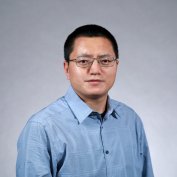Dr. Shiguo Jiang's research focuses on understanding land use/land cover change, forest/agriculture ecosystem dynamics, and human-environment systems through the integrated use of geospatial information technologies (GIS, remote sensing, GPS) and spatial statistical methods.
His group's major research interests include:
-
Remote Sensing, GIS and Spatial Statistics
-
Land Use Land Cover Change
-
Climate Change and Environmental Modeling
-
Vegetation Ecology
-
Terrestrial Carbon Cycle
Join the Jiang Group
New members must complete a two-hour training, which can be arranged in either a 2-hour session or two 1-hour sessions. Please read the training materials and schedule training with me.
Current Graduate Students
If you have already been admitted to a graduate program at UAlbany, then please get in touch ([email protected]).
I am happy to collaborate/serve as advisor/committee member for students from Department of Geography and Planning, Department of Sociology, Department of Information Science, School of Criminal Justice, School of Public Health, or any other departments and institutions.
Currently, we have no fund for Graduate Research Assistants (GRA). However, I will be happy to work with you if you can identify other funding resources. Please feel free to contact me if you are interested in my lab.
Prospective Graduate Students
Unfortunately, I am unable to respond to most queries from prospective students who have not yet been admitted to a graduate program at UAlbany. Apply to the Graduate School.
I am affiliated with the PhD Program in Department of Information Science, College of Emergency Preparedness, Homeland Security and Cybersecurity, UAlbany, where I recruit PhD students. For those who want to work with me as PhD students, please apply to the Information Science PhD program.
Undergraduate students interested in research are encouraged to contact me ([email protected]) for possible research projects.
Students should be familiar with one programming language (such as C++, Java, Python, R, IDL or Matlab). Experiences with one geospatial software (ENVI, Erdas, ArcGIS, QGIS, etc.) is also required.
Students from any major are welcome to contact me for possible collaboration and research opportunities.
Currently, we have no positions for postdoctoral researchers. New openings will be announced once they are available.
Visiting scholars with research interests related to our lab are strongly encouraged to contact me ([email protected]).



